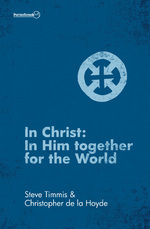Tim Chester's Blog, page 37
December 30, 2014
Three new books on sexual purity
Here are three recent books on sexual purity
 Purity is Possible
Purity is PossibleHelen Thorne, Purity is Possible: How to Live Free of the Fantasy Trap, The Good Book Co.
Here’s the commendation I wrote for this book:
“At last a book on sexual temptation for women (though there’s much for men to learn here as well). Purity Is Possible is honest, real, realistic – all of which makes the hope that it offers truly hopeful. Above all it points to the freedom and purity that we find through faith in the work of Jesus.”
Available here from amazon.com and thinkivp.
 Hide or Seek
Hide or SeekJohn Freeman, Hide or Seek: When Men Get Real with God about Sex, New Growth Press.
I’ve not yet been able to get hold a copy of this, but John Freeman’s material was very helpful when I was writing Captured By A Better Vision or Closing the Window so I’m sure this will be good material.
Available here from amazon.com and amazon.co.uk.
 Finally Free
Finally FreeHeath Lambert, Finally Free: Fighting for Purity with the Power of Grace, Zondervan.
Lambert offers eight gospel-centred strategies for fighting porn: using sorrow, accountability, radical measures, confession your spouse, humility, gratitude and a dynamic relationship with Jesus.
Available here from amazon.com and thinkivp.
 Captured By a Better Vision
Captured By a Better VisionMy own book on overcoming porn is published as Captured By A Better Vision: Living Porn Free in the UK and as Closing the Window in the US.
SPONSORS
Support this site by using these links:

includes Tim Chester’s books
20% of every thinkivp purchase goes
to train Christian leaders in poorer countries

December 27, 2014
The affections and change
In previous posts we looked at the importance of the affections in Puritan spirituality. In this post we begin to explore the link between the affections and change.
The Puritan Stephen Charnock said:
The Passions and Affections are the same, as to the Substance and Nature of the Acts; but the difference lies in the object … The acts of a renewed man, and the acts of a natural man, are the same in the Nature of acts; as when a man loves God, and fears God; or loves man, or fears man, ‘tis the same act of love, and the same act of fear; there are the same motions of the soul … the difference lies in the Objects.
Regeneration then brings about a change in the way view God. The object of love changes. The God we had once distained becomes the One we love. By the ministry of the word the Puritans sought this change of perspective in regeneration and then in strengthening the faith of believers through the work of the Spirit.
This change of affections – and not any change in emotions – was a key indicator of spiritual reality. In The Religious Affections Edwards gives twelve signs of a true work of God. But the last is key: ‘Gracious and holy affections have their exercise and fruit in Christian practice.’
Summarising John Owen, J.I. Packer says: ‘We grow in grace by the deliberate stirring up and exercise of the new powers and inclinations which regeneration implanted within us.’ He then cites Owen: ‘Frequency of acts doth naturally increase and strengthen the habits whence they proceed. And in spiritual habits [e.g. faith, hope, love] it is so, moreover, by God’s appointment … They grow and thrive in and by their exercise … the want thereof is the principal means of their decay.’
See J.I. Packer, ‘The Spirituality of John Owen,’ Among God’s Giants: The Puritan Vision of the Christian Life, Kingsway, 1991. Available here from amazon.com and thinkivp.
SPONSORS
Support this site by using these links:

includes Tim Chester’s books
20% of every thinkivp purchase goes
to train Christian leaders in poorer countries

December 26, 2014
Bible reading plan for 2015
I’ve posted this Bible reading plan before. We use it in The Crowded House Sheffield. If you’ve been using it then you’ll be interested in postcard-sized weekly reading plan for 2015. If you’re not reading through the Bible then the approach of the new year is a good time to review your Bible reading habits. Here are a couple of old posts on why that would be a good idea – Hearing God Speak and Must I Read My Bible Every Day?
This plan has a number of differences from other plans.
1. Flexibility
The plan specifies a number of chapters for each week rather than for each day. This makes it more flexible. You can read a chapter or two each day or you can read it in two or three sittings. Or you can set out reading a chapter a day and then catch up at the weekend. It means it fits more readily around people’s lifestyle.
2. Communal
It is designed to be followed with a partner or among a group of people. There is only one section each week (occasionally two shorter books). So you don’t have to read a section from one book and then a section from another book each day. It means the sections are somewhat uneven, but it makes it easy to discuss what you have been reading when you meet up with other people.
We’ve been using it for a year now and it works very well in this way. I meet up with a friend each week for lunch. It’s easy for us to discuss what we’ve been reading because there is only one Bible book to focus on.
It also means I only need look at the Bible plan once a week – I don’t need to refer to it each day.
3. Realistic
Following this plan you read the OT in three years and the NT twice in three years. This works out at about nine chapters a week. It means you are not rushing through what you are reading to ‘get it done’. I’ve found with other plans I tend to read it with my mind disengaged. This plan gives time to meditate on the passage.
4. Balanced
The plan balances OT history, prophecy, wisdom, Gospel and Epistles throughout the year. You move between genres so you’re never faced with reading OT prophecy continuously for six months.
Here’s the complete three year plan.
SPONSORS
Support this site by using these links:

includes Tim Chester’s books
20% of every thinkivp purchase goes
to train Christian leaders in poorer countries

December 23, 2014
Quotes from One with Christ
 I recently posted a review of One with Christ by Marcus Peter Johnson (available from amazon.com and thinkivp). Here’s a selection of quotes from the book which give a flavour of its content.
I recently posted a review of One with Christ by Marcus Peter Johnson (available from amazon.com and thinkivp). Here’s a selection of quotes from the book which give a flavour of its content.
Calvin: ‘We must understand that as long as Christ remains outside of us, are we are separated from him, all that he has suffered and done for the salvation of the human race remains useless and of no value to us. Therefore, to share in what he has received from the Father, he had to become ours and to dwell with us … for, as I have said, all that he possesses is nothing to us until we grow into one body with him.’ (Institutes, 3.1.1) [I counted five occasions in which this quote is cited in the book!]
Robert Letham: ‘Strictly speaking, we are united to [Christ’s] humanity, but his humanity is inseparable from his deity, due to the hypostatic union. Thus, union with his humanity is union with his person. Moreover, since the person of Christ is that of the eternal Son, we are united to God. Once again, this does not mean any blurring of the Creator-creature distinction, any more than the assumption of humanity by the Son in the incarnation does. His humanity remains his humanity (without confusion, without mixture). So, we remain, creatures.’ (Robert Letham, The Holy Trinity, P&R, 468.)
John 6:54 says: ‘Whoever eats my flesh and drinks my blood has eternal life, and I will raise him up at the last day.’ Some (such as Roman Catholics) interpret this as meaning we are saved by partaking of the body and blood of Jesus in communion. Other (such as Zwingli) equate eating Christ’s flesh and drinking his blood simply with faith. So ‘whoever eats my flesh and drinks my blood’ is seen as synonymous with ‘whoever believes’. But Calvin rejected this equation of partaking of Jesus with faith. Johnson says: ‘Saving intimacy or union with Christ is not the same thing as faith; rather, our saving union with him is the result of faith. The insight here, of Johannine and Pauline origin, is that while faith is surely saving, faith is not salvation; Christ is salvation.’ (52)
‘We are saved … not because of some intrinsic merit of our faith, but because we actually become united to the object of our faith Christ himself.’ (52)
Martin Luther: ‘And if they are one flesh and there is between them a true marriage … it follows that everything they have they hold in common, the good as well as the evil. Accordingly, the believing soul can boast of and glory in whatever Christ has as though it were its own, and whatever the soul has Christ claims as his own. Let us compare these and we shall see inestimable benefits. Christ is full of grace, life, and salvation. The soul is full of sins, death, and damnation. Now let faith come between them and sins, death, and damnation will be Christ’s, while grace, life, and salvation will be the soul’s; for if Christ is a bridegroom, he must take upon himself all the things which are his bride’s and bestow upon her the things that are his. If he gives her his body and very self, how shall he not give her all that is his? And if he takes the body of the bride, how shall he not take all that is hers?’ (The Freedom of a Christian)
J. I. Packer: ‘ God declares [believers] to be righteous, because he reckons them to be righteous; and he reckons righteousness to them, not because he accounts them to have kept the law personally (which would be false judgment), but because he accounts them to be united to the one who kept it representatively (and that is a true judgment). For Paul union with Christ is not fancy but fact – the basic fact, indeed, in Christianity; and the doctrine of imputed righteousness is simply Paul’s exposition of the forensic aspect of it.’ (‘Justification,’ Evangelical Dictionary of Theology, Baker, 596)
‘Once joined to Christ, believers well never be separated from him. This is not because our grasp on Christ is so strong, but because his grip on us is unbreakable. We are not only perfectly and eternally preserved in Christ because his grasp is insuperable, but, should we need even greater assurance, Jesus tells us that his hold on us is undergirded by the invincible grasp of his Father: “I give them eternal life, and they will never perish, and no one will snatch them out of my hand. My Father, who has given them to me, is greater than all, and no one is able to snatch them out of the Father’s hand. I and the Father are one.” (John 10:28-30) The Son and the Father have a common and mutually re-enforcing grasp on those who belong to them.’ (157)
One with Christ is available here from amazon.com and thinkivp.
Note, too, In Christ: In Him Together for the World by Steve Timmis and Christopher de la Hoyde which is part of the Porterbrook Network imprint with Christian Focus. It’s available from amazon.com and amazon.co.uk.
SPONSORS
Support this site by using these links:

includes Tim Chester’s books
20% of every thinkivp purchase goes
to train Christian leaders in poorer countries

December 22, 2014
Themelios review of Everyday Church
The latest edition of Themelios contains an encouraging review of Everyday Church which I co-wrote with Steve Timmis.
Everyday Church is available from amazon.com and ThinkIVP.
SPONSORS
Support this site by using these links:

includes Tim Chester’s books
20% of every thinkivp purchase goes
to train Christian leaders in poorer countries

December 19, 2014
The affections, emotions and appetites
In a previous post we looked at the importance of the affections in Puritan spirituality. In this post we explore the link between affections, emotions and appetites.
The Puritans employ a range of language which can be confusing. In particular, the Puritans (and Augustine) sometimes speak of the will driving the mind (or reason). This is because the affections so determine the will that they can speak of them synonymously. Jonathan Edwards said: ‘The affections are no other than the more vigorous and sensible exercises of the inclination and will of the soul.’ (The Religious Affections, Banner, 24)
The Puritans did not use the word ‘emotions’ (which only came in to common usage later). Thomas Dixon argues that after the eighteenth century, the word ‘emotion’ became a catch-all term that failed to distinguish between a variety of states that had been described in an earlier intellectual climate. Subtle distinctions that were encompassed in terms such as ‘passions’, ‘affections’, ‘sentiments’ and ‘appetites’ were lost. (Thomas Dixon, From Passions to Emotions: The Creation of a Secular Psychological Category, CUP, 2003.)
A helpful rule of thumb is that the term Puritans used for ‘emotions’ is ‘passions’. Our ‘passions’ are different from our ‘affections’. Our affections are our loves, desires, hopes, fears. Perhaps the nearest contemporary word is ‘motives’. Our affections are determined by what we consider the good that should be desired or the evil that should be shunned. These affections therefore drive both the will and passions.
Emotions or passion = affections + circumstances.
For example, if I desire the approval of the people (an affection) and my work is well-received then I’ll feel happy (an emotion). But if my work is not well-received (a change of circumstance) then I will feel sad (an change of emotion). My affection (the desire for approval) does not change, but it produces different emotions under different circumstances.
In Augustine when one’s love is ‘well-directed’ the affections that issue will also be good. These we will experience through a breadth of emotions – they will ‘both fear and desire, and grieve and rejoice’ – but ‘because their love is rightly placed, all these affections of theirs are right.’
Puritans could be wary of the passions because of their tendency to move us away from God. Puritans often distinguished between passions and affections (which were viewed more positively). Sometimes the passions were associated with the body and the affections with the mind.
The Puritans had another category: the appetites. The appetites are bodily responses (like hunger, thirst, tiredness). The Puritans were concerned that people should not be ruled by their appetites. In the self-controlled person, our affections conquer our appetites.
For more on affections and emotions in Puritan thought see Keith Condie, ‘The Puritans, Theological Anthropology and Emotions,’ in True Feelings: The Emotions in the Christian Life and Ministry, ed. Michael P. Jensen, IVP, 2012. True Feelings is available from Amazon.com and ThinkIVP.
SPONSORS
Support this site by using these links:

includes Tim Chester’s books
20% of every thinkivp purchase goes
to train Christian leaders in poorer countries

Reviews of You Can Pray
Here are some early reviews of the US edition of You Can Pray.
You Can Pray is available in the US from my US Amazon store store and in the UK from ThinkIVP
SPONSORS
Support this site by using these links:

includes Tim Chester’s books
20% of every thinkivp purchase goes
to train Christian leaders in poorer countries

December 16, 2014
The affections in Puritanism
In a previous post we looked at the centrality of the affections in the Reformation. In this post we explore the importance of the affections in Puritan spirituality. Future posts will explore the link between affections, emotions and change.
Richard Baxter considered love to be ‘the master passion of the soul’ and delight to be ‘the most powerful, commanding affection, and the end of all the other passions’. John Owen says: ‘Affections are in the soul, as the helm is in the ship; if it be laid hold on by a skilful hand, it turneth the whole vessel which way he pleaseth.’
Some of the early Puritans were shaped to some extent by Aristotle and so they had a strong emphasis on the will, habit and spiritual disciplines. But later Puritans were more shaped by Augustine and the Reformers so they gave a stronger place to the Spirit enlightening the heart to the glories of Christ. William Fenner explicitly distinguishes Puritan thought from that of Aristotle:
The affections are the forcible and sensible motions of the heart, or the will, to a thing, or from a thing, according as it is apprehended to be good or to bee evil … I know Aristotle and most of our Divines too, place the affections in the sensitive part of the Soul, and not in the will, because they are to be seen in the beasts. But this cannot be so, for a man’s affections do most stir at a shame or disgrace.
In other words, the affections are not mere animal passions subject to the will. They are integrated with the will. In The Practice of Piety Charles Hambrick-Stowe concludes: ‘Puritanism was as affective as it was rational.’ He cites the Puritan Thomas Shepard: ‘I have seen God by reason and never been amazed at God. I have seen God himself and have been ravished to behold him.’
Jonathan Edwards offers perhaps the sharpest exposition of a Puritan view of the affections in The Freedom of the Will. Edwards argues that the will is not independent. It is integrally bound up with our understanding and affections. In particular, the acts of the will arises from the affections. We always do what we want to do.
Because of sin our affections are disoriented they no longer want to do what is right. We do not sin because of some natural necessity. We are not made to sin against our will. There is no gun against our head or hand over our hand forcing us to sin. but we do sin out of a moral necessity because our will always follows our affections and our affections are misplaced. So the freedom of our will and our bondage to sin are entirely compatible.
This is essentially an Augustinian view of humanity. The difference (which is really no difference at all) is this: According to Augustine, we always choose what we love, while according to Edwards, we always do what we want to do.
The mind and the affections are in a dynamic relationship, each affecting the other. The affections are influenced by the mind in the sense that we desire what we perceive to be desirable. But the mind also justifies what the affections desire. We suppress the truth in our wickedness, for example (Romans 1:18). Together they drive the will. But ultimately the affections are supreme.
SPONSORS
Support this site by using these links:

includes Tim Chester’s books
20% of every thinkivp purchase goes
to train Christian leaders in poorer countries

December 14, 2014
Review: Marcus Peter Johnson on union with Christ
 Review: Marcus Peter Johnson, One with Christ: An Evangelical Theology of Salvation, Crossway, 2013.
Review: Marcus Peter Johnson, One with Christ: An Evangelical Theology of Salvation, Crossway, 2013.Available here from amazon.com and thinkivp.
One with Christ is a great book. It’s a fresh look at the doctrine of salvation through the lens of our union with Christ. Here’s Johnson’s own summary of what he’s trying to do:
In far too many evangelical expressions of the gospel, the saving work of Christ has been so distanced from his person that the notion of a saving personal union with the incarnate, crucified, resurrection, living Jesus strikes us as rather outlandish … We are dire need of the reminder that Christ’s saving work is of no benefit to us unless we are joined to the living Saviour whose work it is. (15)
The focus is on salvation, but there’s a suggestive chapter on original sin, and a thought-provoking chapter on the word and sacraments.
Back in the day when I was working on my PhD a wrote a paper in union with Christ at the top of which my supervisor wrote ‘Calvin’. At the time I’d read relatively little of Calvin himself. Yet I had apparently imbibed much of his theology through my up-bringing in UK Reformed, evangelical churches. That paper went on to form the conclusion of my PhD. I mention this because One with Christ is marred by a tendency to rather over-state the uniqueness of the book – a failing which also makes many of Tom Wright’s recent books irritating reads! Perhaps the vagaries of publishing demand this sort of thing. But at times Johnson seems to portray himself as the only evangelical who has ever thought about union with Christ – a claim which is consistently undermined as he brings out quote after quote from evangelical luminaries to support his case!
But please don’t let this put you off the book. It is full of good material – material to inform your mind and warm your heart.
I’ll post some quotes from the book in a future post.
 Note, too, In Christ: In Him Together for the World by Steve Timmis and Christopher de la Hoyde which looks at the missiological implications of our union with Christ. It’s part of the Porterbrook Network imprint with Christian Focus and is available here from amazon.com and amazon.co.uk.
Note, too, In Christ: In Him Together for the World by Steve Timmis and Christopher de la Hoyde which looks at the missiological implications of our union with Christ. It’s part of the Porterbrook Network imprint with Christian Focus and is available here from amazon.com and amazon.co.uk.
SPONSORS
Support this site by using these links:

includes Tim Chester’s books
20% of every thinkivp purchase goes
to train Christian leaders in poorer countries

December 11, 2014
1 Samuel for You video

Here’s two-minute video introducing 1 Samuel for You, my latest contribution to The Good Book Company’s God’s Word for You, which I mentioned in a post a couple of days age.
1 Samuel for You is available in the US from amazon.com and in the UK from ThinkIVP.
SPONSORS
Support this site by using these links:

includes Tim Chester’s books
20% of every thinkivp purchase goes
to train Christian leaders in poorer countries

Tim Chester's Blog
- Tim Chester's profile
- 181 followers




